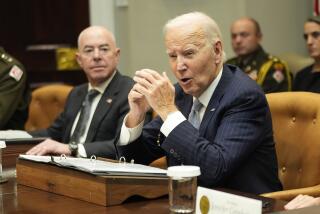A Pakistani Christian family is scheduled to arrive in the U.S. next week as refugees. Will they be allowed to stay?

Since being approved two weeks ago to fly to the United States as a refugee, Shaz Sadiq has read her Bible and prayed nightly that nothing goes wrong.
She fled her native Pakistan — where her father had been killed in a church shooting and she had received frequent death threats — in 2013 and has spent the last four years in Bangkok, Thailand, applying for refugee status and permanent resettlement in a place safe for Christians.
“Every day is a miracle. And every day feels like a year,” said Sadiq, 42, who is scheduled to arrive at Washington Dulles International Airport the afternoon of July 6 with her sister and mother.
Sadiq, who has no relatives in the United States and has never been in the country, could be among the last refugees of her kind admitted to the U.S. — at least for a while — now that the Supreme Court has revived President Trump’s travel ban.
With exceptions for people with a “bona fide relationship” to schools, employers, family or other U.S. entities, the ban going into effect Thursday will block admissions of people from six majority-Muslim countries for 90 days as the government evaluates its vetting procedures.
Pakistan is not on that list. But the travel order also bans refugees from all countries for 120 days.
Advocates for immigrants and refugees have been struggling to interpret the court’s less-than-clear language on who is exempt from the new travel rules and say that the federal government has caused confusion by not releasing guidelines on which refugees it will accept.
The State Department is studying how to define “bona fide relationship,” spokeswoman Heather Nauert said this week. Refugees already en route — whether they have a bona fide relationship to the U.S. or not — would be allowed into the U.S. through July 6.
“Beyond that, we don’t know,” Nauert said.
Sadiq said she’s confident she and her family members will be able to start their new lives. She hopes to find work as a translator, her profession in Pakistan.
“This restriction is not for us,” she said. “We will make it.”
But a representative of the resettlement agency helping her family, the International Rescue Committee, said he’s less sure because her scheduled arrival comes at the brink of the deadline. A small delay on either of her two flights could push her over.
“I’m not confident this family will make it in,” said Ruben Chandrasekar, a regional director for the organization in the Washington, D.C., area.
“A lot will depend on the exact guidance we get from the State Department,” he said.
We are friendly, polite women. We want to live our own lives. We are not going to be a bother.
— Shaz Sadiq
Sadiq is being resettled with his office because she knows an employee of the organization in the Washington area for whom she did translation work in Pakistan. But that kind of relationship may not be enough to pass government muster should she arrive late or local officials decide to apply their own discretion, Chandrasekar said.
“This family has no family member connection in the area, so that also makes it harder to make a case if we have to,” he said.
About 40% of refugees in the U.S. arrive with no family in the country. And because of their status as refugees, they tend to not have the kind of job or university connection other immigrants could use to bypass the ban.
Refugee groups have argued that people who have been connected to resettlement agencies in the U.S. — a requirement to resettle — should be able to count those agencies as U.S. connections for travel purposes.
People with bona fide ties should include “anyone who has an existing relationship with a nonprofit, frankly tens of thousands of refugees,” said Becca Heller, director of the International Refugee Assistance Project. The organization is among those whose lawsuit against the travel ban the Supreme Court will consider in the fall.
But the State Department, the main federal agency that handles refugee resettlement, hasn’t weighed in on that question.
On Thursday, Muslim Advocates, the Southern Poverty Law Center and Americans United for Separation of Church and State — all opponents of the travel ban — sent a letter to Homeland Security Secretary John F. Kelly asking for “immediate guidance” on how it will be implemented.
Justin Cox, an attorney at the National Immigration Law Center, questioned whether immigration authorities are receiving clear guidance. “If they are violating what the Supreme Court said, we can and will go back to the courts,” he said.
Advocates are hoping for a smoother rollout of the travel ban than what happened with the original version of the ban, which included green card holders being blocked and tens of thousands of visas being canceled amid confusion at U.S. airports and embassies across the world. That ban included a preference for refugees who were religious minorities in their countries, including Christians such as Sadiq.
Though Sadiq, her sister, Rahila, and their mother, Doris, passed a vetting process that took years, they plan to celebrate only after passing customs agents and stepping foot on American soil.
“Our heart is dead with so many things,” she said. “We don’t have excitement. Maybe we will once we get to America.”
She said she hopes that anti-immigrant views in the U.S. won’t affect her family.
“If you have a guest in your house and the guest does not follow the rules, you have to understand if the guest has problems,” she said. “But we are not troublemakers. We are friendly, polite women. We want to live our own lives. We are not going to be a bother.”
Staff writer Tracy Wilkinson in Washington contributed to this report.
Jaweed Kaleem is The Times’ national race and justice correspondent. Follow him on Twitter, Facebook and Instagram.
More to Read
Sign up for Essential California
The most important California stories and recommendations in your inbox every morning.
You may occasionally receive promotional content from the Los Angeles Times.











